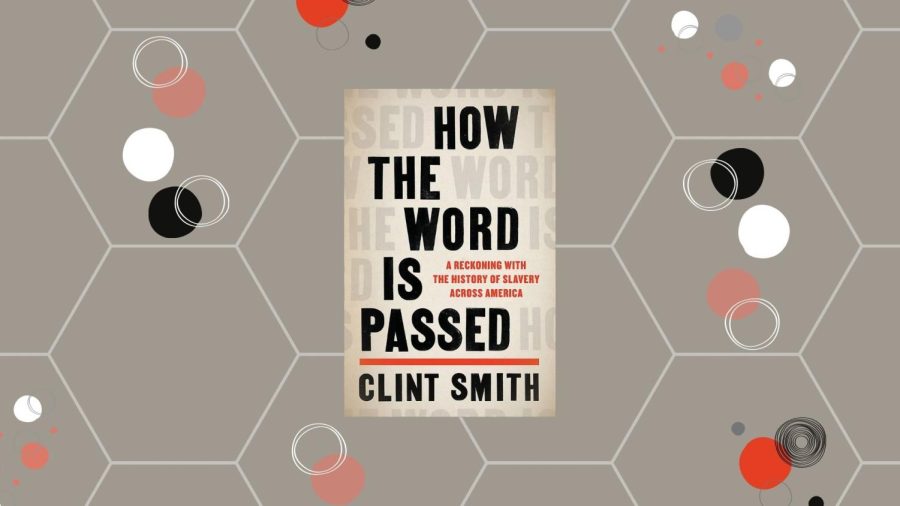One Book team brings programming for ‘How the Word Is Passed’ to NU
Daily file illustration by Laya Neelakandan
This year’s One Book One Northwestern selection is “How the Word Is Passed” by Clint Smith.
September 27, 2022
Author Clint Smith begins “How the Word Is Passed” with a vignette on his drive to Monticello, a plantation in Central Virginia and the summer home of Thomas Jefferson. Smith discusses his tour of Monticello and imagines the lives of slaves, bought and sold under the nose of a man who, Smith writes, is one of many who “fought for their own freedom while keeping their boots on the necks of hundreds of others.”
“How the Word Is Passed” — Smith’s debut nonfiction book blending reporting, memoir and historical research — is this year’s selection for One Book One Northwestern. Books chosen for the program often tie into relevant societal issues, according to Nancy Cunniff, director of One Book, and she said recent debates surrounding critical race theory in American classrooms made “How the Word Is Passed” especially relevant.
The novel exemplifies Smith’s curiosity, which seems to transcend his accolades, One Book faculty chair and history Prof. Leslie Harris said. Harris will also interview Smith at the Oct. 18 One Book keynote on NU’s Evanston campus.
“He presents himself as a lifelong learner,” Harris said. “I think we have to remain curious in order to continue to preserve … our freedom.”
The One Book selection process begins just before Winter Quarter, when the faculty election committee narrows community submissions to five finalists, which are read by the committee over Winter Break. It makes a final decision in January, Cunniff said.
After the organization chooses the book, Cunniff said, it partners with campus groups to facilitate events around the novel.
Weinberg sophomore and One Book Ambassador Diana Deng said ambassadors reach out to students by putting up posters throughout campus and designing events centered around the book.
“The One Book team wants to hear … how students might be interested in (One Book) activities, and they want their events to be attractive,” she said.
Weinberg junior and One Book Fellow Alex Feng said One Book’s programming during his remote freshman year helped him engage with the community.
“There’s not really campuswide programming around certain themes, and One Book offers this opportunity for people on campus to be on the same page,” Feng said.
Harris said she is excited about the October “Beyoncé Mass,” a worship service promoted by One Book, that will feature Beyoncé’s music and seek to honor Black female spirituality. Other upcoming events like the NU “Social Justice Tour” and “Understanding the Historic Evanston Black Community” focus more on educational outreach.
Smith is from New Orleans, which was an epicenter of the U.S. slave trade. Harris, also a fellow native, said she wasn’t exactly taught about slavery in school. Instead, she said she heard mostly in passing about how the city’s free Black people owned enslaved people before the Civil War.
New Orleans also lacks modern-day landmarks related to its history of slavery, Harris said.
“There were no markers that really identified slave-trade sites in a big war, so it was easy to ignore,” Harris said. “In terms of a larger sense of the history of slavery and its economic importance, I think that was not discussed very thoroughly (in New Orleans).”
She added that she admired Smith’s dialogue with people he encountered at historic sites because it promotes interpersonal understanding in a divided nation.
While investigating pre-Civil War slavery lays the groundwork for “How the Word Is Passed,” Feng said the book uses historical context to explain how racism presents itself in society today.
One formal institution Smith addresses is the Angola Prison: a maximum-security penitentiary in Louisiana. The book describes the prison as filled with Black men working for no pay, and Smith uses the prison to discuss larger themes of mass incarceration.
“His book emphasizes that (slavery’s) legacies are still affecting … experiences that different Americans have in both formal institutions as well as informal institutions,” Feng said.
Email: [email protected]
dialogues: @swarthout_iris
Related Stories:
— History Prof. Leslie Harris announced as One Book One Northwestern faculty chair
— “How the Word Is Passed” announced as 2022-23 One Book selection
— ‘Just Mercy’ author Bryan Stevenson delivers One Book One Northwestern keynote












